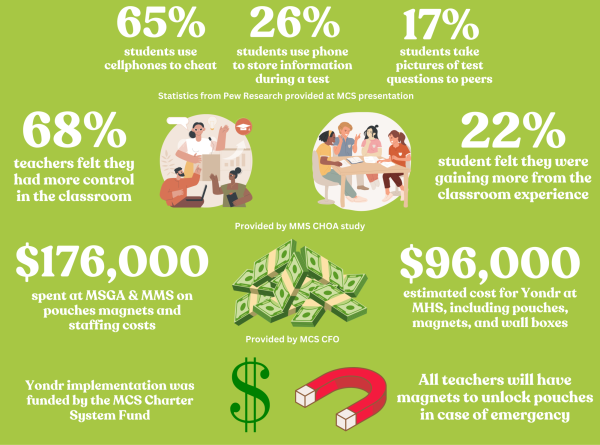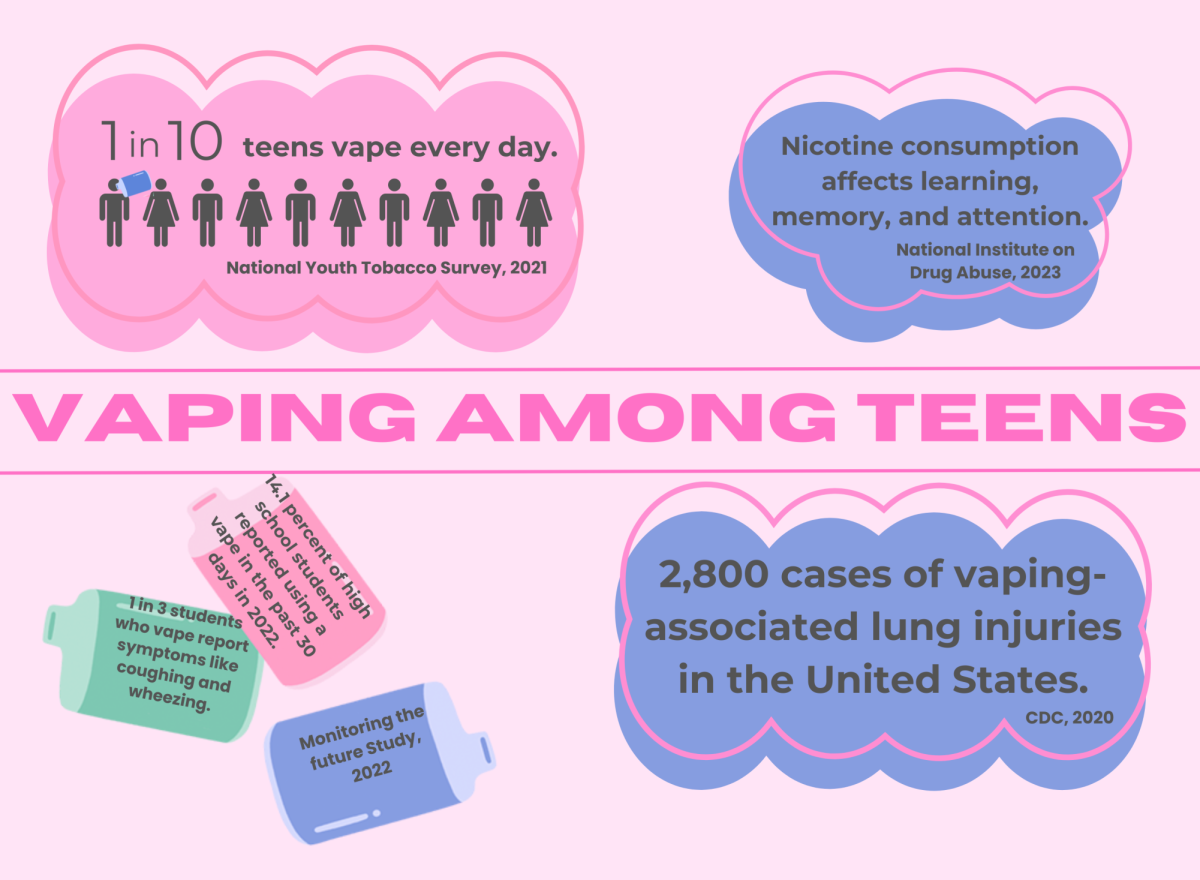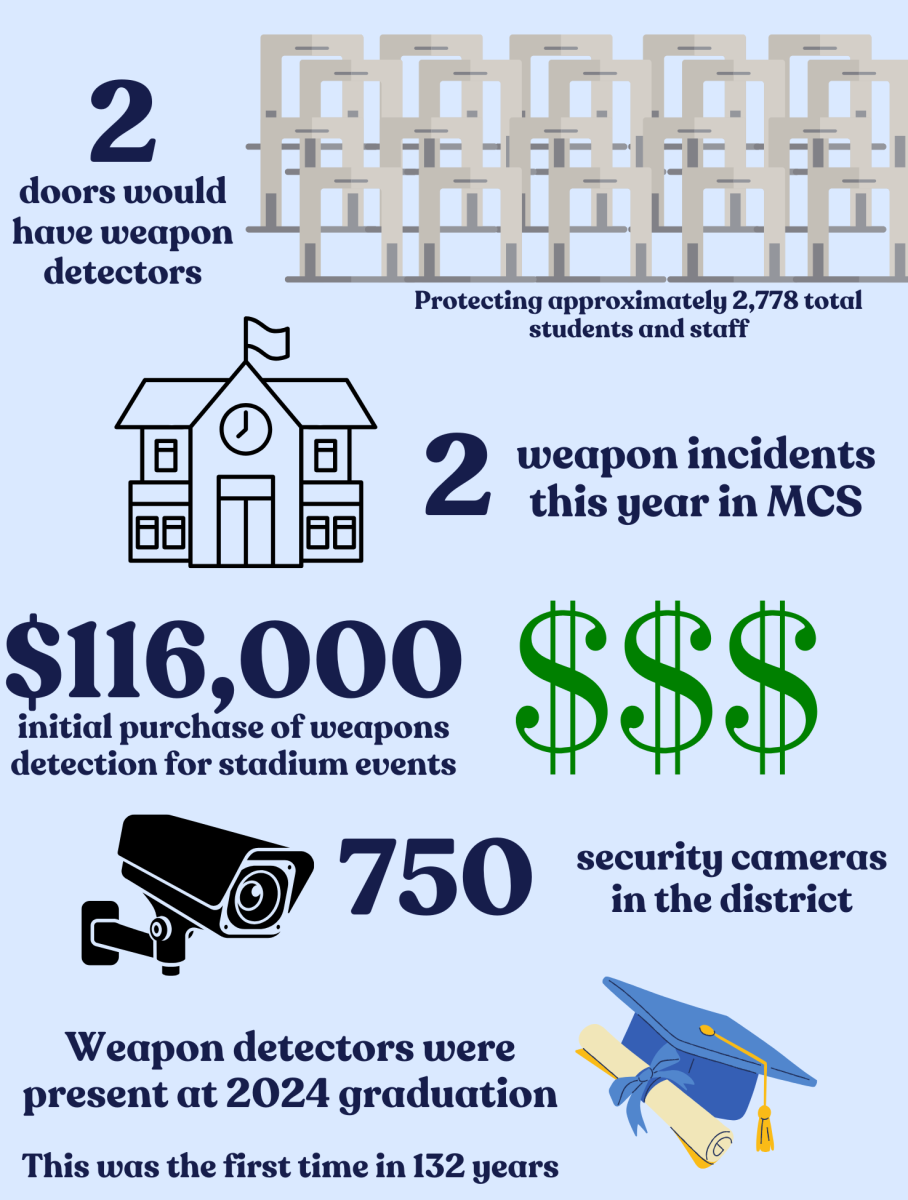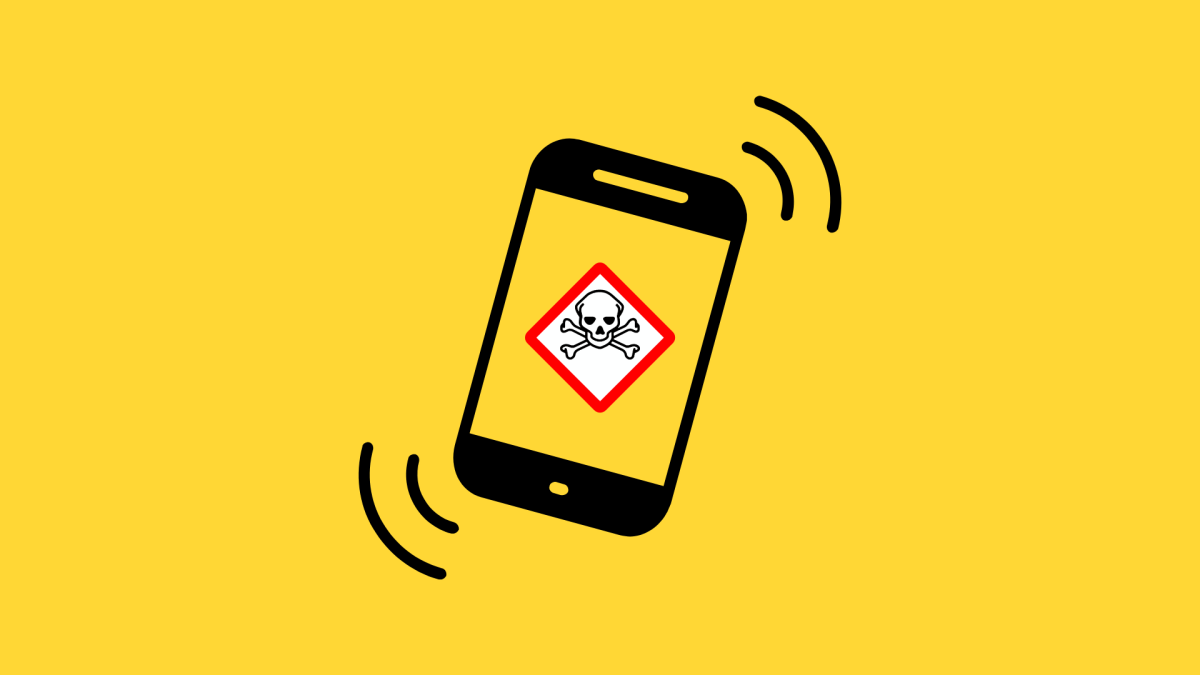Pondering Pouches
Students, staff, and community members are awaiting a future board meeting, with a date yet to be confirmed, to find out whether Yondr pouches will be implemented at Marietta High beginning next school year. It is a controversial topic in which students, teachers, and parents all have varying opinions. Superintendent Dr. Grant Rivera has held multiple meetings with teachers, students, parents and community members to explain the purpose behind a potential expansion of Yondr pouches from grades 6-8 to the high school. Other meetings have been organized by parents and students in opposition to the potential implementation. In department meetings at MHS last month, teachers were asked to vote whether they want Yondr or not, and according to many teachers, the vote was overwhelmingly in favor of the pouches. No official voting numbers have been provided yet.
If Rivera makes the recommendation to the MCS Board of Education, no matter if the teacher’s majority vote is in favor of Yondr, or if students and parents are not in favor, the ultimate decision will still be based upon a vote from the seven-member Board to determine if the high school receives the Yondr pouches next school year.
If Yondr pouches do get approval, there will be more questions looming about decisions to be made about personal laptops and tablets. Most MHS students use school-issued Chromebooks, which can be easily monitored and controlled by the school via applications such as lockdown browsers or GoGuardian. Phones and other personal devices, on the other hand, are out of the school’s control in terms of what students can access or do. Yondr pouches could be one possible solution for that lack of control.
“Anything you need to do, you can do with a school-issued Chromebook,” Rivera said. “I think the question shouldn’t be how we work around restrictions but try to find better resources provided and approved by the school.”
Yondr pouches have a magnetized closure that is designed to keep a student’s phone (and smartwatch) locked throughout the school day. If approved, the pouches would be issued to MHS students and kept with them for the entirety of the school year as their personal pouch. At the start of the day, students would close their phone and watch inside the Yondr pouch as they enter through the newly approved AI weapons detection, the same kind already used at football and basketball games. The pouch would remain locked for the entire day. At the end of the school day, pouches can be opened by students with a magnet that would be at exits around the building. Those magnet openers would be put on the walls prior to dismissal every day.
Similar procedures are already enforced at a nearby Atlanta school, Midtown High. A select group of MHS teachers visited the high school to explore their implementation of Yondr pouches. According to Midtown High’s administration, parents were “overwhelmingly supportive” noting the “biggest concern” was a student being able to contact them in the case of an emergency. At Midtown High, students and parents can communicate via messaging on Schoology, which is their Learning Management System and accessible on the school-issued Chromebooks. Director of Technology and Information Systems, Mr. Torey Bradley, for MCS has confirmed that parents and students at MCS would have some type of communication enabled. Most likely it would be ‘whitelisting’ parent/guardian contacts for email messaging to be accessible through a student’s email account. Teachers would also have access to magnets that would only be used in case of emergency once the situation, no matter if it was an evacuation or a lockdown, was secure and they were given permission to do so. These are concessions that would have explicit policy and protocol once Yondr pouches were approved.

Pouch Prices
The cost of the Yondr pouches is a primary concern. According to the Chief Financial Officer of MCS, Erin Franklin, the implementation of the Yondr pouches at MSGA and MMS was around $176,000. These costs included the pouches, magnets, and staffing costs. At the high school, the cost is estimated to be $96,000, making the total price of the sixth grade, middle school, and high school’s Yondr pouches $272,000.
This is being funded by the Charter System Fund, which is how charter schools like Marietta High get their funding for school improvement, certain programs, or other ways to help students and the school. Similar to Midtown High, students at MHS will have to pay for an additional pouch if it’s damaged or lost.
Pouch Perceptions
Most teachers have a distaste for phone use in class if it is not for instructional purposes. After all, it is disruptive and disrespectful for students to be on their phones while a teacher is giving direct instruction. Without the pouches, some teachers are more lenient on how students use their phones and they allow them to have them out while working if they aren’t being disruptive or doing something inappropriate, and some allow students to have their phone if their class work is done. Other teachers are much stricter and do not want phones out at all or they require phones to be put away in a secure place in the classroom. Some students just won’t put their phones away, so the idea of them being kept in a pouch in their bags sounds appealing and might alleviate distraction, conflict or punishment.
Midtown High’s administration noted perceived increases in teacher and student’s positive mental health, social activity and engagement, but they explained that they could not have “valid data” on improvement in academics because it could be the result of other factors as well. There was data showing a decrease in student altercations compared to prior years directly related to phone use. Student perceptions at Midtown High were varied, with some noting a neutral experience with positives and negatives. Every student, without fail, ultimately said they wanted their phone, but each were willing to also admit at least one or more benefits.
“Yondr pouches have honestly helped. It is really annoying to have your phone locked up all day, but I feel like I’m a lot more locked in in all of my classes,” Frailie Mercer (11), a junior at Midtown High said.
Yondr pouches have also already been implemented at the sixth grade MSGA and seventh through eighth grade at MMS, but the process is a bit different. At MMS, teachers begin first period by distributing the pouches for students to put their phones or watches in the case. The students then carry that with them all day until it is unlocked by their last period teacher before the bell rings. The pouches stay at the school.
MCS partnered with Children’s Health Care of Atlanta and Emory to conduct research with MMS, and they had student and faculty focus groups. According to the study, students in an MMS focus group felt they were “connecting better with their classmates now, leading to fewer fights and more engagement.” Students also “see some benefits, like fewer distractions, but still feel there are distractions in the classroom.” Some voiced “frustration about not being able to use their phones after finishing their work.” Among more logistical or cost efficiency problems, at least one student in each of the MMS focus groups noted “seeing others break the magnet on their phone pouches or not using them at all.” Teachers noted students were “more engaged” and “developing more socialization skills.” Teachers felt appreciation for administration handling confiscation and consequences, which “alleviates the power struggle in the classroom.”
Pouch Problems
Students rely on their phones to contact friends and family, to make changes to plans for the day, to check on what is happening in the world, to take pictures, to listen to music, and to scroll on social media.
“I probably use my phone the most at school communicating with my parents and friends in the hallway,” Lucy Tyran (10) said. “I don’t feel like it gets in the way of my schoolwork. Sometimes I even use it for school.”
Phones are often needed for school related work. QR scans are everywhere for information and involvement. Elective classes like Audio Video Technology and Film, journalism, architecture, engineering use phones for certain assignments, and many academic classes actually benefit from phone usage with certain apps, to film content, to play class quiz games, to record interviews or take pictures, or to do things that school Chromebooks cannot provide or are not as practical for accessibility. A downside of school-issued Chromebooks is that a lot of websites are restricted from students accessing them, which can interfere with research or even teacher approved website or videos from YouTube are blocked. Many students will use their phone instead. Some dual enrollment classes and computer programs require a phone for two-factor authentication to log in, and many IB students say that accessing Managebac for IB is much more user friendly on the phone app. Rivera has admitted that there may need to be concessions for certain uses in classes, but the policies for that would not be determined until later if the Yondr pouches are voted in. He has also said that other resources could be provided to teachers if they were needed.
Many students use their phone responsibly but there are a number of students who misuse technology in the classroom and create distractions or cause problems outside of class. Yet most students do not think that locking up their phones in pouches for the entirety of the day is the right answer.
“I feel like whether I have my phone or not doesn’t matter, if I don’t pay attention with it, I’m not going to pay attention without it,” Zola Storino (10) said.
On the other hand, some students admit that phones can be a distraction during class but taking away phones could be counterproductive or a waste of money. Some students prefer to have their phone away and say teachers could use a calculator holder as phone pouches as many already do, and they work effectively. Of course, sometimes a student will put a fake phone in the holders or sneak it out, but either way, if they get caught with it, they get punished. Since the phone holders work well in classes where the teacher enforces it, it makes Yondr pouches seem rather pointless to some.
“I don’t want them, but I think I’m neutral on it because I don’t think it’s going to have as big of an impact on teachers and students as people say it will,” Aarav Tandel (9) said.
Another concern about the Yondr pouches for both parents and students are emergencies such as lockdowns and evacuations. This is something students have expressed major concern for. Students like having their phones on them for a sense of safety and having them locked up in pouches can take that away from them. School resource officers and other safety officials have said that it is important that students not use their phone in an emergency. Students should be listening to directions to get to a place of safety. Dr. Rivera has said that teachers will have a magnet to unlock their students’ phones in case of an emergency once they are in a place of safety, but for many, this still does not bring comfort to students whose largest concern is unpredictable emergency. In the MMS student focus group, “safety was a big concern, especially with some mentioning the recent school shooting in Apalachee.”
There are also the concerns of students’ medical needs like diabetes or students with 504 plans, which ensure equal access to education and prohibits discrimination based on disabilities, who might need devices or have special accommodations throughout the day that require a phone or smartwatch or other tech accessories. Other students with anxiety, depression, or other conditions noted they rely on their parents’ support throughout the day and could want to quickly text them. One parent described it as a “lifeline” between her and her student.
At MMS and Midtown high, students with diabetes, for example, have a similar pouch with velcro instead of magnets to make the phone easily accessible for medical needs. However, there is much to be answered about other exceptions. That remains on the to-be-determined list if and when Yondr pouches get approved by the Board.
Parents vs Pouches
Parents want access to their students to know what is happening in their child’s life, in and out of the classroom during the school day, and they want their students to have the best possible technology. Sure, there are some parents who are in favor of the pouches, but the clear opposition has come from a group of parents leading meetings, writing open letters and publishing articles after they felt their voices were not being heard.
At a parent-organized meeting on March 10 at The Brickyard, a venue on the Marietta Square, an open meeting was held to discuss the possible implementation of Yondr pouches among other possible technology bans. Parents shared the location and purpose of the meeting through social media and word of mouth, so The Pitchfork had a staff member attend. Not one person in attendance spoke in favor of the pouches. Two Board members were present, Jaillene Hunter and Jeff DeJarnett, so the parents were pleased that the Board members were able to hear the concerns parents felt had been disregarded.
Mrs. Meaghan Timko, an MHS parent, has written an article “Are we in a moral panic?” on Medium.com to inform people of details concerning HB340, the “Distraction-Free Education Act” that passed a K-8 ban in Georgia and awaits Governor Kemp’s signature or veto. It also highlights explanation about author Jonathan Haidt’s book “The Anxious Generation,” the lobbying firm McGuireWoods and their connections to Yondr being used in schools. Her plea is not to have unlimited use of phones in the classroom. She argues that there are “so many other ways to approach this that don’t require excessive financial commitment of tax payer dollars and completely cutting parents off from their children.” She pleas for an “Off and Away” policy and “to prepare [students] to be better digital citizens.”
In “Let freedom ring: An open letter to the school board for digital literacy” by MHS mother, Mrs. Jennifer Willis and read by over 2,800 people, she asks the Board to “find a better, more economical, solution” and to “vote no to the ban.” She begins with a “plea to empower our teens” for a “tech driven world” to “achieve digital literacy.” She uses UNICEFs definition of digital literacy reminding that the agency protects the rights of children around the world. She believes “we all have the same goal: to have a distraction-free classroom” and asks for “a consequence when a rule is broken.” While the main goal of having the Yondr pouches is to cultivate more attention in the classroom, parents find that the focus and energy fostered in whatever outlet students choose is overlooked and invalidated by the stereotypes that have been placed upon students’ lack of attention or addiction to their phones. Willis wrote that “the data is offensive not only to these families but to the young adults who don’t have time to scroll.”
Meetings, debates, articles, conversations, letters, teacher votes, have all occurred, but until a Board meeting agenda is announced, everyone involved waits. The decision is ultimately up to the Board to decide the future of phones at MHS. The Pitchfork will post the date of the board meeting on social media @mhspitchfork when it is announced.







